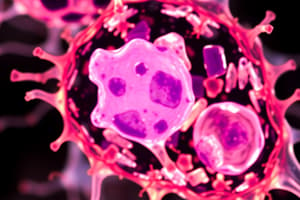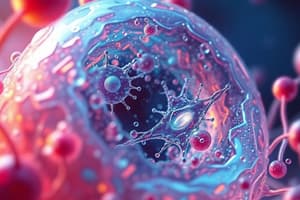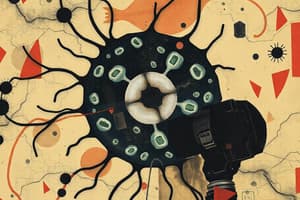Podcast
Questions and Answers
What significant observation did Robert Hooke make in 1665?
What significant observation did Robert Hooke make in 1665?
- He discovered the structure of DNA.
- He created the first electronic microscope.
- He observed tiny living organisms in a drop of water.
- He identified and named cells while examining cork. (correct)
Who contributed to the formulation of the cell theory in 1838?
Who contributed to the formulation of the cell theory in 1838?
- Robert Hooke and Louis Pasteur.
- Rudolf Virchow and Anton van Leeuwenhoek.
- Matthias Schleiden and Theodor Schwann. (correct)
- Hermione Granger and Albert Einstein.
What aspect of cells did Theodor Schwann discover?
What aspect of cells did Theodor Schwann discover?
- Only bacteria are made of cells.
- Cells are only present in plants.
- Cells can exist independently without a nucleus.
- Every part of an animal is made of cells. (correct)
Which of the following is not a part of modern cell theory?
Which of the following is not a part of modern cell theory?
What did Matthias Schleiden discover about plants?
What did Matthias Schleiden discover about plants?
Robert Hooke discovered cells while examining a section of cork with a simple light telescope.
Robert Hooke discovered cells while examining a section of cork with a simple light telescope.
The cell theory was formalized by Rudolf Virchow in 1858.
The cell theory was formalized by Rudolf Virchow in 1858.
Matthias Schleiden was an English scientist who concluded that all parts of a plant are composed of cells.
Matthias Schleiden was an English scientist who concluded that all parts of a plant are composed of cells.
Anton van Leeuwenhoek studied a drop of water and described cells using a light microscope.
Anton van Leeuwenhoek studied a drop of water and described cells using a light microscope.
Every organism is made up of more than one cell, according to the current understanding of cell theory.
Every organism is made up of more than one cell, according to the current understanding of cell theory.
Flashcards
Cell Theory
Cell Theory
The concept that cells are the fundamental units of life, and all organisms are composed of cells.
Robert Hooke
Robert Hooke
Observed 'cells' while viewing cork under a microscope in 1665.
Basic unit of life
Basic unit of life
The concept that cells are the smallest living structures.
Cell
Cell
Signup and view all the flashcards
Anton van Leeuwenhoek
Anton van Leeuwenhoek
Signup and view all the flashcards
Who discovered cells?
Who discovered cells?
Signup and view all the flashcards
What did Leeuwenhoek discover?
What did Leeuwenhoek discover?
Signup and view all the flashcards
Schleiden's discovery
Schleiden's discovery
Signup and view all the flashcards
Schwann's discovery
Schwann's discovery
Signup and view all the flashcards
What is cell theory?
What is cell theory?
Signup and view all the flashcards
Study Notes
Cell Structure and Functions
- Living things, like non-living things, are made from chemical elements like carbon, hydrogen, oxygen, and nitrogen
- Cells are the fundamental building blocks of living matter
- Cells are the smallest unit of life that can carry out all life processes
- Cells are composed of molecules
Discovery of the Cell
- In 1665, Robert Hooke, an English scientist, used a crude microscope to examine a cork tree section. He observed tiny chambers and named them "cells."
- Anton van Leeuwenhoek, a Dutch scientist, improved the microscope and observed other cells in 1670.
- Matthias Schleiden (German botanist) and Theodor Schwann (German physiologist) in 1838 proposed that all plants and animals are made of cells.
- Rudolf Virchow (German researcher) in 1858 formalized the cell theory
Cell Theory
- The cell is the basic structural and functional unit of life
- All organisms are composed of cells
Studying That Suits You
Use AI to generate personalized quizzes and flashcards to suit your learning preferences.




